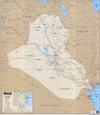As Operation Phantom Phoenix and its subordinate operations progress in central and northern Iraq, Coalition forces confirmed killing a senior al Qaeda in Iraq leader in Diyala province. Coalition force killed Abu Layla al Suri, who is also known as Abu Abd al Rahman, during an intelligence-driven raid in the city of Miqdadiyah in Diyala province, where al Qaeda has established a safe haven.
Al Suri, which translates to “the Syrian,” was leader in Diyala, the province al Qaeda claimed as the capital of its Islamic State of Iraq during late 2006. Multinational Forces Iraq did not respond to an inquiry from The Long War Journal about al Suri’s nationality. He was “intricately involved in the terrorist network operating in the Diyala River Valley region since October 2006, and was closely associated with several al-Qaeda in Iraq senior leaders,” Multinational Forces Iraq reported.
Abu Maysara, a member of the inner circle of al Qaeda in Iraq leader Abu Ayyub al Masri who served as a senior adviser providing spiritual guidance to wage a terror campaign, was among al Suri’s associates. US forces killed Maysara, a Syrian national, in November 2007. Al Suri also “had ties to the al-Qaeda in Iraq propaganda cell leaders in Baghdad, due to his involvement in terrorist media and propaganda operations in Diyala.”
Al Suri was killed while wearing a suicide vest. “The ground force found numerous fake IDs and media materials on site, believed to belong to al-Suri, to include propaganda and recruiting videos showing al-Qaeda in Iraq executions and attacks,” Multinational Forces Iraq reported.
The Diyala al Qaeda leader was killed prior to the onset of Operation Raider Harvest, which is focusing on al Qaeda in Iraq in the Miqdadiyah region. Al Qaeda in Iraq established a safe haven in the rural Miqdadiyah region after the terror group was ejected from the Baghdad region. Raider Harvest is a subordinate operation to Phantom Phoenix, the overarching security operation targeting al Qaeda’s network throughout central and northern Iraq.
Coalition and Iraq forces have killed seven al Qaeda, wounded four, and captured 26 since Raider Harvest began on Jan. 8. Three al Qaeda operatives were killed and two captured during a Jan. 15 raid on Miqdadiyah.
Iraqi and Coalition forces are nearing the end of the clearing phase of Raider Harvest and are seeking to transfer to the holding phase of the operation. “The big part of [Raider Harvest] is that now the area will be tied to Miqdadiyah, its closest and largest urban center, and Miqdadiyah will be tied to the province, so the chain of communication between local villages and the Iraqi government will be established,” said Lieutenant Colonel James Brown, the executive officer of 4th Stryker Brigade Combat Team, 2nd Infantry Division. “That chain was not there before, so the local people were ripe for [al Qaeda in Iraq] to fill that need for them.”
Multinational Division North launched Operation Iron Harvest, also a subordinate operation to Phantom Phoenix in the four northern provinces of Ninewa, Salahadin, Tamin (Kirkuk), and Diyala on Jan. 8. As of Jan. 14, Iron Harvest resulted in 60 al Qaeda killed and 193 captured, along with 79 weapons caches with thousands of pounds of explosives and about 100 IEDs found and destroyed.
Al Qaeda in Iraq continues look for seams in Diyala province. While suicide bombings have decreased from a spike seen in Diyala in December, al Qaeda was able to conduct a successful strike in the province on Jan. 15. A female suicide bomber detonated her vest as Shia worshippers celebrated Ashura near a mosque in the town of Khan Bani Saad, just south of Baqubah. Nine civilians were killed and six wounded in the attack.









1 Comment
For those who keep saying there’s “no political progres in Iraq”, here is some countervailing consensus building, even as the kvetching continues
Micro versus macro political progress in Iraq is an interesting dynamic. Early in teh invasion, macro progress was huge, then, finally, aroudnthe time of the Surge, micro progress set in after lagging, or even being a trailing indicator that had caused…